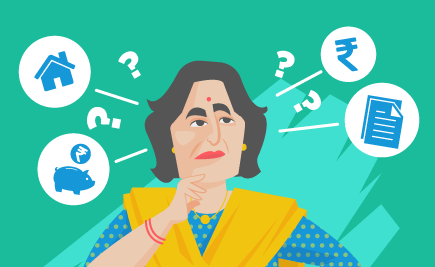
Investment often takes the back seat in a 20-something’s financial to-do list. This is because making ends meet becomes the first priority when you are living paycheck-to-paycheck. However, amends need to be made when in the 30s. Putting things in order at this age is essential to have a successful financial portfolio, especially for women who are faced with certain financial obstacles to building wealth at different stages in life.
Although the number of working women in India have gone up with time, when it comes to independent investment, the number is significantly low. According to a survey carried out by a well-known AMC, only 23% of the working women indulge in investment. The rest either depend on parents or spouses to do the needful on their behalf. While most of these working women get to know about the investments after the decision has been taken, some jointly participate in taking the decisions.
Let’s look at some essential steps you must take at the 30s for a financially steady future.
-
Avoid Getting Into Debt and Work Towards an Emergency Fund
Be it Education Loan, Personal Loan or Car Loan, debts can bog you down if not cleared off at the right time. The first step towards building wealth is to get rid of debts, especially the bad ones. If you are not able to clear off all at one go, you need to prioritise the ones that have a relatively higher interest rate.
Do not take any further loans or indulge in expensive purchases such as luxury cars and houses before you clear off your current debts as it would only get you into a debt trap. You can make an exception for your Home Loan as it comes with the tax advantage.
Once your debts are paid off, you will have more liquidity to build a contingency corpus. This fund needs to be worth six to eight months of your expenditure.
-
Insure Yourself
People are often confused between investment and insurance and they end up substituting one with the other. Investment and insurance are both critical to financial planning and you need both to build a strong financial structure for your future.
When it comes to insurance, women largely depend on the employer’s insurance or family floater. This could fall short at times of emergency. Working women should consider a separate insurance plan. Term Insurance for life coverage and Health Insurance for medical exigencies are a must have in the portfolio. Critical illness plans, endowment, etc. depending on your risk appetite and asset allocation.
-
Think Long Term: Think Retirement
Women have been known for being long-term investors and since the number of active years is less for them, they must start planning for retirement early. You need to identify the right assets for long-term investment goals. Some popular long-term investment instruments are equity, PPF, pension plan etc. However, consider the tax aspect and the work of inflation on your money in order to calculate the effective return.
-
Be Open to Risk
Research states that women avoid taking a risk and they prefer putting their money into safer and guaranteed saving options such as bank deposits, PPF, insurance, etc. These instruments fetch relatively lower return than market-related products such as equity. So, taking a bit of informed risk can actually boost your investment portfolio and fetch better return which would also be tax efficient in the long run.
-
Balanced Portfolio
When you indulge in investment, remember to have a balanced portfolio. Being completely debt oriented or equity oriented could limit your return. Maintaining the right balance is necessary. If you need help with asset allocation, you can always consult an expert for advice.
All those women who are struggling for equality with their male counterparts must understand that independence begins with financial freedom.
BankBazaar.com is a leading online marketplace in India that helps consumers compare and apply Credit Card, Personal Loan, Home Loan, Car Loan, and insurance.
